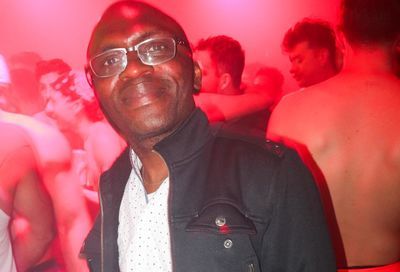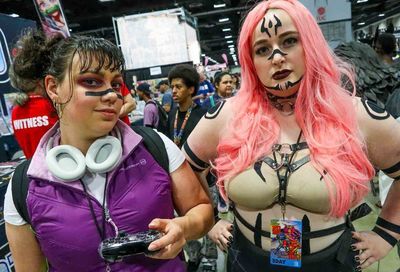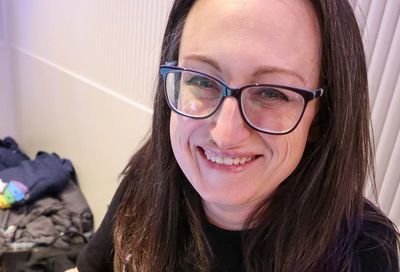Women's Work
Learning Curve
Among the many pleasures of last month’s Reel Affirmations Film Festival was seeing myself on the big screen. I’m proud to have been just one of many, many women’s music fans and activists to have had a cameo in Radical Harmonies, the new documentary celebrating thirty years of the women’s music movement. It took six years to complete this film and bring it into distribution, a real labor of love.
The screening I attended was sold out, packed with women of all backgrounds sighing in appreciation. It was a night to pay homage to Washington-based artists and producers in women’s music: the film’s creators, Boden Sandstrom and Dee Mosbacher, both have roots in the D.C. area. Boden, along with artist Casse Culver, founded WomanSound in D.C. in 1975, and both were present that night to answer nostalgic audience questions.
One storyline in Radical Harmonies is the astonishing success of the first women’s recording company, Olivia Records, founded here in D.C. in 1973. The original collective of five women who dared to begin a woman-owned and operated company eventually relocated to California and produced the top-selling lesbian album of all time, Cris Williamson’s The Changer and the Changed. Olivia Records also produced albums by Meg Christian, Linda Tillery, Deidre McCalla, Dianne Davidson, Lucie Blue Tremblay, Tret Fure, Teresa Trull, Barbara Higbie, and others, and by late 1982 was so successful that a ten-year anniversary concert by Meg and Cris filled New York’s Carnegie Hall. The double album recording of that historic concert was a lesbian favorite throughout the turntable era.
Of course, Olivia moved on to producing CDs. In 1990, Olivia founder Judy Dlugacz launched the famous Olivia Cruises line, which to date has taken nearly 50,000 women on lesbian-tailored cruise and resort trips to Alaska, Tahiti, Australia, the Caribbean, and yes, Lesbos. Studious historians of Ellen DeGeneres will remember that during her “coming out” episode, some stations ran an ad for Olivia Cruises while other refused to do so, creating a storm over selective, lesbo-phobic censorship.
To understand why the “women’s music movement” has such meaning for women of my generation — the over-35s — it’s important to remember that movement pioneers like Dlugacz created and sustained jobs for women.
Homophobia and sexism flourished in the supposedly “progressive” world of 1960s folk and rock, making it almost impossible for lesbian artists with a feminist message to win recording contracts. After all, straight men were the music industry’s corporate heads, moneymaking artists, and consumers. Women who were not themselves artists but keenly interested in gaining access to technical training in concert sound, lighting, album engineering or basic stage production were locked out of an old-boy network with a specific union profile.
The do-it-yourself ethic that drew strength from second-wave feminism led thousands of other women to declare “We’ll start our own company!” When I interviewed Boden Sandstrom about how she herself had been inspired to start WomanSound in 1975, she told me about a Meg Christian concert staged by Olivia Records in 1974. “That particular night I saw Judy Dlugacz mixing sound. She was virtually mixing on the stage…and it totally struck me that this was something I’d love to do. It moved me. And I remember that I said to her, ‘How do you get to do that?'”
Obsessed with women’s music and culture, I wrote a book about all this, Eden Built by Eves, in 1999 and then worked on an Olivia Cruise to the Mediterranean in summer 2000. I reported to Judy in between wonderful, sometimes hilarious excursions on land as I tripled up as a guest lecturer, artist liaison and tour guide. You haven’t lived until you’ve seen your favorite artist praying at Israel’s wailing wall or singing in a deserted, ancient temple in Turkey. My cruise was a working experience, but as I raced around bringing gear to performers and dispensing Egyptian etiquette tips I was aware that I was in an all-female command center, though of course the ship employed male chefs, cabin stewards and one rather lonely priest. All these opportunities and salaries, generated by lesbian music!
In wild contrast, after seeing Radical Harmonies at the Reel Affirmations festival I ran across town to hear Joan Baez in concert at Lisner Auditorium. Now, I love Joan and all she stands for. She was my idol during my antiwar 1960s childhood. Yet I immediately noticed that her back-up musicians and all the sound engineers and stagehands on the tour were men. Few jobs for women were being generated by someone otherwise impeccably progressive, and I found myself taking notes in my journal in the dark, considering how involvement in women’s music has raised my awareness of lesbian economics. This same phenomenon bothered me during the temporarily popular Lilith Fair, which fronted women artists but had mostly male stagehands, sound and light experts, and back-up musicians. “It’s because these are union halls” is the standard response to an absence of lesbian roadies, but no one seems too roused to ask why, thirty years after Olivia Records started, women still aren’t welcome in “nontraditional” jobs or in organized labor outreach.
Meanwhile, Judy Dlugacz is at work on a book about her experiences as a lesbian entrepreneur. It’s a book we all need to read, because the lesbian community still can’t decide if it’s “okay” for women to be successful, to move from collective to company, from bean sprouts to board room. We need to keep celebrating the visionaries whose long-range woman-owned business ventures have offered women the opportunity to earn a living doing what they love, and have trained women in jobs that were closed to them due to discrimination, not ability.
Bonnie J. Morris, Ph.D., is on the women’s studies faculty at George Washington University and Georgetown University. She can be reached at bmorris@metroweekly.com.
Support Metro Weekly’s Journalism
These are challenging times for news organizations. And yet it’s crucial we stay active and provide vital resources and information to both our local readers and the world. So won’t you please take a moment and consider supporting Metro Weekly with a membership? For as little as $5 a month, you can help ensure Metro Weekly magazine and MetroWeekly.com remain free, viable resources as we provide the best, most diverse, culturally-resonant LGBTQ coverage in both the D.C. region and around the world. Memberships come with exclusive perks and discounts, your own personal digital delivery of each week’s magazine (and an archive), access to our Member's Lounge when it launches this fall, and exclusive members-only items like Metro Weekly Membership Mugs and Tote Bags! Check out all our membership levels here and please join us today!




















